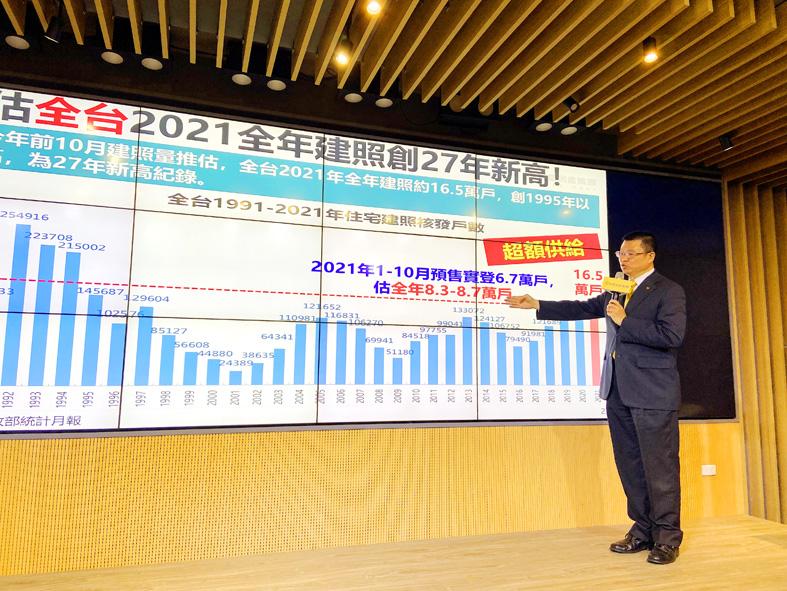Housing transactions might hold steady or rise a mild 3 percent next year on top of an estimated 7.4 percent pickup this year, as tightening measures and lower GDP growth would cool the property market, Evertrust Rehouse Co (永慶房屋) said yesterday.
The projection suggests there would be 345,000 to 355,000 transactions next year, as authorities aim to induce a soft landing for home prices, Evertrust general manager Yeh Ling-chi (葉凌棋) said.
Evertrust data showed that housing prices soared 9.4 to 28.6 percent this year in Taipei, New Taipei City, Taoyuan, Hsinchu, Taichung, Tainan and Kaohsiung, despite three waves of credit controls, Yeh said.

Photo: Hsu Yi-ping, Taipei Times
Price hikes are especially evident this quarter at 28.6 percent in Tainan, 27 percent in Hsinchu and 22.4 percent in Kaohsuing, Yeh said.
The three cities have benefited from technology firms expanding factory capacity to meet business needs, he said.
The central bank’s ban on grace periods for second-home mortgages in the seven areas appear futile in discouraging home purchases, Yeh said.
Instead, inflation and price hike concerns have prompted people to buy homes before it is too late, he said.
An internal survey showed that 81 percent of respondents feel prices have climbed at least 5 percent in the past year, while respondents in Hsinchu said that the price gains surpassed 10 percent, Evertrust research manager Daniel Chen (陳賜傑) said.
The survey showed that 73 percent believe inflation would intensify next year, with 66 percent preferring real estate as a hedge, Chen said.
Seventy-one percent, a 13-year high, expect housing prices to rise in the next three months, while 53 percent advocated joining the market in the first half of next year, he said.
The sense of urgency is from the belief by a big majority that the central bank plans to raise interest rates in the second half of next year, he said, adding that 62 percent expect two hikes of 12.5 basis points each.
Central bank Governor Yang Chin-long (楊金龍) last week said that if all sectors come out of the woods and inflation worsens, interest rates might return to the levels seen before the COVID-19 pandemic.
The survey showed that 86 percent of respondents can tolerate an added mortgage burden equivalent to a rate hike of 75 basis points, Chen said.

UNCERTAINTY: Innolux activated a stringent supply chain management mechanism, as it did during the COVID-19 pandemic, to ensure optimal inventory levels for customers Flat-panel display makers AUO Corp (友達) and Innolux Corp (群創) yesterday said that about 12 to 20 percent of their display business is at risk of potential US tariffs and that they would relocate production or shipment destinations to mitigate the levies’ effects. US tariffs would have a direct impact of US$200 million on AUO’s revenue, company chairman Paul Peng (彭雙浪) told reporters on the sidelines of the Touch Taiwan trade show in Taipei yesterday. That would make up about 12 percent of the company’s overall revenue. To cope with the tariff uncertainty, AUO plans to allocate its production to manufacturing facilities in

TAKING STOCK: A Taiwanese cookware firm in Vietnam urged customers to assess inventory or place orders early so shipments can reach the US while tariffs are paused Taiwanese businesses in Vietnam are exploring alternatives after the White House imposed a 46 percent import duty on Vietnamese goods, following US President Donald Trump’s announcement of “reciprocal” tariffs on the US’ trading partners. Lo Shih-liang (羅世良), chairman of Brico Industry Co (裕茂工業), a Taiwanese company that manufactures cast iron cookware and stove components in Vietnam, said that more than 40 percent of his business was tied to the US market, describing the constant US policy shifts as an emotional roller coaster. “I work during the day and stay up all night watching the news. I’ve been following US news until 3am

COLLABORATION: Given Taiwan’s key position in global supply chains, the US firm is discussing strategies with local partners and clients to deal with global uncertainties Advanced Micro Devices Inc (AMD) yesterday said it is meeting with local ecosystem partners, including Taiwan Semiconductor Manufacturing Co (TSMC, 台積電), to discuss strategies, including long-term manufacturing, to navigate uncertainties such as US tariffs, as Taiwan occupies an important position in global supply chains. AMD chief executive officer Lisa Su (蘇姿丰) told reporters that Taiwan is an important part of the chip designer’s ecosystem and she is discussing with partners and customers in Taiwan to forge strong collaborations on different areas during this critical period. AMD has just become the first artificial-intelligence (AI) server chip customer of TSMC to utilize its advanced

Six years ago, LVMH’s billionaire CEO Bernard Arnault and US President Donald Trump cut the blue ribbon on a factory in rural Texas that would make designer handbags for Louis Vuitton, one of the world’s best-known luxury brands. However, since the high-profile opening, the factory has faced a host of problems limiting production, 11 former Louis Vuitton employees said. The site has consistently ranked among the worst-performing for Louis Vuitton globally, “significantly” underperforming other facilities, said three former Louis Vuitton workers and a senior industry source, who cited internal rankings shared with staff. The plant’s problems — which have not